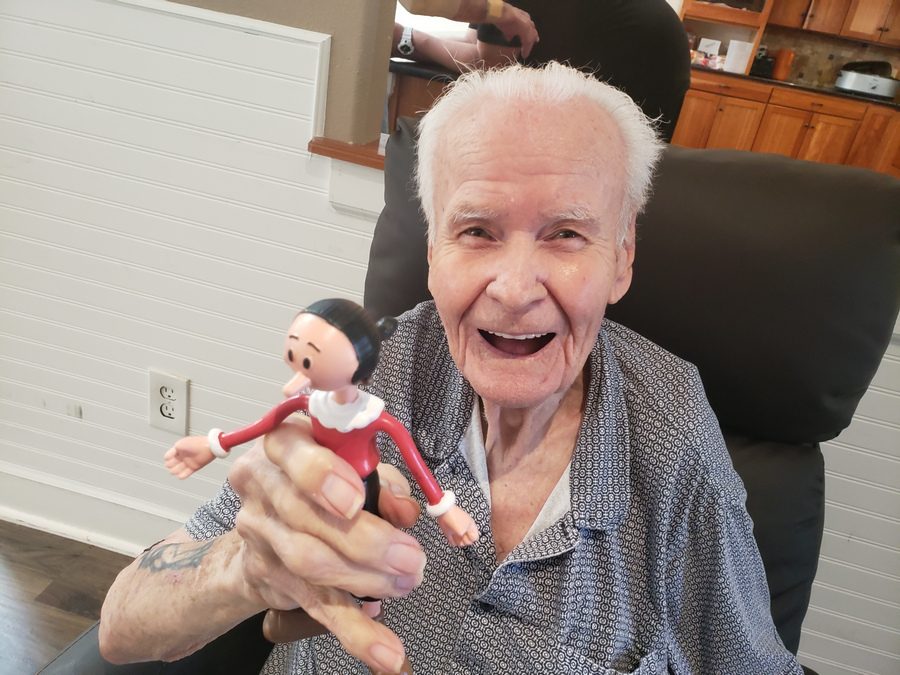Why Personalized Memory Care is Important for Alzheimer’s Support
Why Personalized Memory Care is Important for Alzheimer’s Support
Blog Article
Everything About Memory Treatment Providers: Why Little Memory Treatment Houses Are a Fantastic Selection
Memory treatment solutions play a crucial role in sustaining individuals with Alzheimer's and mental deterioration. Tiny memory care homes stand apart for their personalized technique and intimate setting. With lower staff-to-resident ratios, these homes promote more powerful connections and tailored care. Homeowners benefit from boosted social interactions and a secure atmosphere. As families explore options, recognizing the special advantages of little memory care homes comes to be essential. What variables should be considered when picking the best home?
Understanding Memory Care Solutions
While numerous might recognize with basic elderly care choices, understanding memory treatment services is vital for families encountering the obstacles of cognitive decline. Memory treatment particularly satisfies people with conditions such as Alzheimer's disease and other types of mental deterioration. These solutions give an organized environment that focuses on enhancing the quality of life for locals with specialized care and support.Memory treatment centers are designed to ensure security and protection, typically featuring secured environments to avoid roaming. Educated personnel are readily available all the time to assist with daily tasks, medicine monitoring, and individual care. Additionally, memory treatment programs frequently include cognitive stimulation tasks, customized to engage citizens and advertise mental wellness. Households can take advantage of recognizing these services, as they enable notified decisions regarding their enjoyed ones' care, ensuring that their particular needs and preferences are attended to in a caring and helpful manner.
The Benefits of Small Memory Care Houses
Small memory treatment homes provide distinct benefits that can greatly improve the lifestyle for locals with cognitive impairments. One considerable advantage is the intimate environment, which enables tailored interactions amongst staff and citizens. This smaller sized setup cultivates meaningful connections, reducing feelings of isolation and anxiousness usually experienced by people with memory issues.Additionally, the lower staff-to-resident proportion in tiny memory care homes allows caregivers to give more conscientious guidance and support. This approach not only enhances safety and security but also advertises a feeling of protection for the residents.Moreover, tiny memory care homes can adjust rapidly to the distinct needs and preferences of each homeowner, permitting a much more homey atmosphere. Such an environment can urge social engagement and engagement in tasks, inevitably enhancing the daily experiences of those living with cognitive problems.
Personalized Treatment Plans for Homeowners
Individualized treatment plans are vital in memory care homes, as they deal with the special needs and choices of each resident. These strategies begin with comprehensive assessments carried out by competent specialists, that review cognitive capacities, case history, and personal passions. This tailored approach guarantees that care is not only reliable yet also respectful of each individual's self-respect and autonomy.Moreover, personalized treatment strategies are versatile, enabling adjustments as citizens' needs evolve gradually. This adaptability promotes a complacency and familiarity, which is essential for people dealing with memory obstacles. Caretakers are trained to carry out these strategies consistently, supplying assistance that aligns with the locals' regimens and preferences.Ultimately, personalized treatment plans enhance the quality of life for locals by promoting engagement, wellness, and independence, making them a fundamental aspect of memory treatment solutions in tiny memory care homes.
Producing a Home-Like Setting
Producing a home-like atmosphere is important for fostering comfort and knowledge in memory care settings, as it substantially influences citizens' emotional well-being. Small memory care homes typically prioritize tailored touches, such as cozy color schemes, family photos, and familiar furnishings arrangements, which aid citizens feel more secure. Integrating aspects similar to a typical home, like relaxing living areas and common locations, urges a feeling of belonging.Moreover, using natural light and exterior areas can enhance the ambience, advertising relaxation and harmony. Personnel play a considerable role in preserving this environment by engaging with citizens in a compassionate manner, treating them like family members. Routine tasks, such as food preparation or horticulture, can likewise contribute to a home-like feeling, providing possibilities for locals to take part in meaningful experiences. On the whole, developing a nurturing environment sustains cognitive function and emotional stability, making it an important facet of memory care solutions.
Improved Social Interaction and Neighborhood
Improved social communication and area are crucial parts of memory care services. By promoting personalized social engagement and developing a family-like environment, these solutions promote meaningful links amongst citizens. Team occasions and activities additionally encourage engagement, aiding individuals really feel extra included and sustained.
Customized Social Involvement
While social communication is necessary for total health, several individuals with memory disabilities usually have a hard time to engage meaningfully with others. Customized social engagement in memory care homes addresses this challenge by creating tailored activities that deal with residents' distinct interests and capabilities. By concentrating on private choices, caregivers can cultivate connections that resonate deeply with everyone. Activities such as art treatment, music sessions, and assisted discussions promote cognitive excitement and psychological expression. Additionally, little group setups urge sociability and enable for more intimate communications, improving sensations of belonging. This strategy not just combats feelings of isolation yet likewise empowers locals to preserve a feeling of identification, ultimately adding to boosted psychological health and lifestyle.
Family-like Atmosphere
In a memory treatment setting, fostering a family-like ambience significantly enhances social interaction and builds a sense of area amongst residents. Smaller memory treatment homes usually focus on intimate atmospheres, permitting citizens to form closer connections with each other and personnel members. This nurturing environment promotes depend on, which is vital for people with memory problems. Locals are more probable to talk and share experiences, creating a helpful network that eases sensations of loneliness. The familiarity of navigate to this website shared rooms and regimens adds to a feeling of belonging, even more motivating social interaction (personalized memory care). In such settings, psychological bonds flourish, resulting in improved general well-being and a higher top quality of life for residents as they navigate their daily experiences with each other
Team Activities and Occasions

Safety and Safety And Security Attributes in Small Residences
Lots of tiny homes made for memory treatment integrate crucial safety and safety and security attributes to guarantee the health of citizens. These homes typically utilize safe entry and leave points to stop straying, a typical issue amongst individuals with memory impairments. In addition, security systems and alarm mechanisms boost monitoring, ensuring that team can promptly react to any type of uncommon activities.Interior designs are customized for safety, with minimized risks such as sharp edges and clutter-free pathways. Handrails and non-slip flooring are generally installed to decrease the risk of falls. Team member are educated in emergency situation protocols, guaranteeing they are gotten ready for different situations.Moreover, individualized care strategies might consist of assessment of private safety and security needs, providing customized remedies for each and every citizen. On the whole, these security and safety features develop a caring environment where residents can flourish while maintaining their self-respect and self-reliance.
Exactly how to Choose the Right Memory Care Home
Just how can families assure they select one of the most appropriate memory care home for their loved ones? The decision requires careful factor to consider of a number of aspects. First, households should review the center's staff qualifications and training, making certain that caretakers are experienced in managing memory-related conditions. Next off, it's important to assess the home's setting, concentrating on safety attributes and whether it promotes a sense of community and belonging. Visiting the center can give understanding right into day-to-day tasks and the social atmosphere, which are crucial for mental stimulation and emotional wellness. Additionally, family members ought to make inquiries regarding the treatment plans offered, guaranteeing they are tailored to individual demands. Thinking about the home's location and accessibility for family sees can contribute to a smoother change. By dealing with these elements, families can make an enlightened decision that prioritizes their enjoyed one's convenience and quality of life in a memory care setting.
Frequently Asked Concerns
What Qualifications Should Personnel Members in Memory Care Residences Have?
Employee in memory care homes must have pertinent qualifications, experience in mental deterioration treatment, strong communication skills, and concern. Continuous training in behavioral management and therapeutic interventions enhances their capability to support locals properly.
Just How Do Memory Care Services Differ From Typical Assisted Living?
Memory treatment solutions concentrate especially on individuals with memory problems, providing specific support and structured atmospheres. In comparison, standard assisted living offers general assistance with daily tasks, doing not have the customized approach necessary for those with cognitive challenges.
What Kinds of Tasks Are Offered in Memory Care Homes?
Memory care homes usually supply a selection of additional info tasks developed to involve citizens. Typical choices consist of art treatment, songs sessions, cognitive video games, physical workouts, horticulture, and social occasions, all targeted at boosting wellness and cognitive feature.
Can Residents Bring Their Own Personal Belongings to Memory Treatment Residences?
Homeowners can commonly bring their own valuables to memory care homes, enabling them to personalize their home - personalized memory care. This method aids create a familiar setting, advertising comfort and a sense of identity for the individuals

How Are Family Members Associated With the Treatment Refine?
Member of the family play an essential role in the care procedure, often joining decision-making, attending care conferences, and offering psychological assistance. Their involvement cultivates a collective environment, boosting the citizen's total well-being and lifestyle. While numerous might be familiar with general senior care alternatives, recognizing memory treatment services is essential for households encountering the obstacles of cognitive decline. These solutions navigate to this website supply a structured environment that concentrates on improving the high quality of life for homeowners via specialized care and support.Memory care facilities are developed to assure security and protection, frequently including protected settings to stop roaming. Customized care strategies are important in memory treatment homes, as they provide to the distinct needs and preferences of each citizen. Team members in memory treatment homes should possess relevant accreditations, experience in mental deterioration treatment, solid communication abilities, and empathy. Memory care solutions focus especially on people with memory disabilities, offering customized support and structured atmospheres.
Report this page